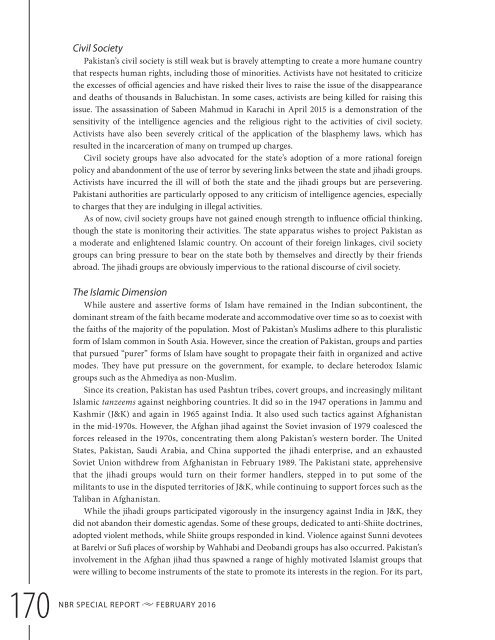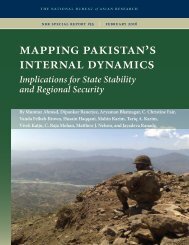pakistan’s
SR55_Mapping_Pakistan_February2016
SR55_Mapping_Pakistan_February2016
Create successful ePaper yourself
Turn your PDF publications into a flip-book with our unique Google optimized e-Paper software.
Civil Society<br />
Pakistan’s civil society is still weak but is bravely attempting to create a more humane country<br />
that respects human rights, including those of minorities. Activists have not hesitated to criticize<br />
the excesses of official agencies and have risked their lives to raise the issue of the disappearance<br />
and deaths of thousands in Baluchistan. In some cases, activists are being killed for raising this<br />
issue. The assassination of Sabeen Mahmud in Karachi in April 2015 is a demonstration of the<br />
sensitivity of the intelligence agencies and the religious right to the activities of civil society.<br />
Activists have also been severely critical of the application of the blasphemy laws, which has<br />
resulted in the incarceration of many on trumped up charges.<br />
Civil society groups have also advocated for the state’s adoption of a more rational foreign<br />
policy and abandonment of the use of terror by severing links between the state and jihadi groups.<br />
Activists have incurred the ill will of both the state and the jihadi groups but are persevering.<br />
Pakistani authorities are particularly opposed to any criticism of intelligence agencies, especially<br />
to charges that they are indulging in illegal activities.<br />
As of now, civil society groups have not gained enough strength to influence official thinking,<br />
though the state is monitoring their activities. The state apparatus wishes to project Pakistan as<br />
a moderate and enlightened Islamic country. On account of their foreign linkages, civil society<br />
groups can bring pressure to bear on the state both by themselves and directly by their friends<br />
abroad. The jihadi groups are obviously impervious to the rational discourse of civil society.<br />
The Islamic Dimension<br />
While austere and assertive forms of Islam have remained in the Indian subcontinent, the<br />
dominant stream of the faith became moderate and accommodative over time so as to coexist with<br />
the faiths of the majority of the population. Most of Pakistan’s Muslims adhere to this pluralistic<br />
form of Islam common in South Asia. However, since the creation of Pakistan, groups and parties<br />
that pursued “purer” forms of Islam have sought to propagate their faith in organized and active<br />
modes. They have put pressure on the government, for example, to declare heterodox Islamic<br />
groups such as the Ahmediya as non-Muslim.<br />
Since its creation, Pakistan has used Pashtun tribes, covert groups, and increasingly militant<br />
Islamic tanzeems against neighboring countries. It did so in the 1947 operations in Jammu and<br />
Kashmir (J&K) and again in 1965 against India. It also used such tactics against Afghanistan<br />
in the mid-1970s. However, the Afghan jihad against the Soviet invasion of 1979 coalesced the<br />
forces released in the 1970s, concentrating them along Pakistan’s western border. The United<br />
States, Pakistan, Saudi Arabia, and China supported the jihadi enterprise, and an exhausted<br />
Soviet Union withdrew from Afghanistan in February 1989. The Pakistani state, apprehensive<br />
that the jihadi groups would turn on their former handlers, stepped in to put some of the<br />
militants to use in the disputed territories of J&K, while continuing to support forces such as the<br />
Taliban in Afghanistan.<br />
While the jihadi groups participated vigorously in the insurgency against India in J&K, they<br />
did not abandon their domestic agendas. Some of these groups, dedicated to anti-Shiite doctrines,<br />
adopted violent methods, while Shiite groups responded in kind. Violence against Sunni devotees<br />
at Barelvi or Sufi places of worship by Wahhabi and Deobandi groups has also occurred. Pakistan’s<br />
involvement in the Afghan jihad thus spawned a range of highly motivated Islamist groups that<br />
were willing to become instruments of the state to promote its interests in the region. For its part,<br />
170<br />
NBR<br />
SPECIAL REPORT u FEBRUARY 2016



